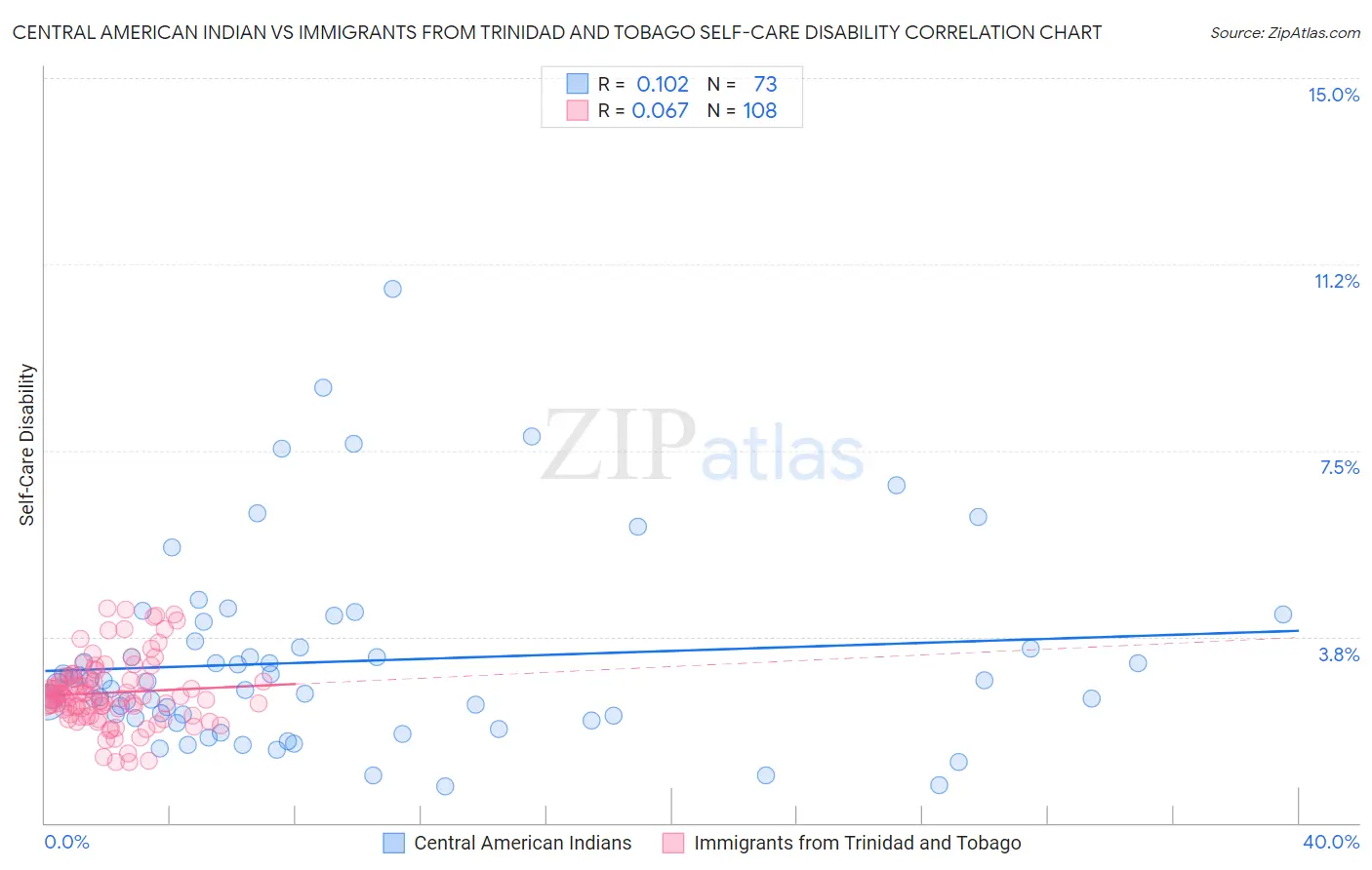Central American Indian vs Immigrants from Trinidad and Tobago Self-Care Disability
COMPARE
Central American Indian
Immigrants from Trinidad and Tobago
Self-Care Disability
Self-Care Disability Comparison
Central American Indians
Immigrants from Trinidad and Tobago
2.7%
SELF-CARE DISABILITY
0.0/ 100
METRIC RATING
292nd/ 347
METRIC RANK
2.7%
SELF-CARE DISABILITY
0.1/ 100
METRIC RATING
275th/ 347
METRIC RANK
Central American Indian vs Immigrants from Trinidad and Tobago Self-Care Disability Correlation Chart
The statistical analysis conducted on geographies consisting of 325,913,892 people shows a poor positive correlation between the proportion of Central American Indians and percentage of population with self-care disability in the United States with a correlation coefficient (R) of 0.102 and weighted average of 2.7%. Similarly, the statistical analysis conducted on geographies consisting of 223,419,964 people shows a slight positive correlation between the proportion of Immigrants from Trinidad and Tobago and percentage of population with self-care disability in the United States with a correlation coefficient (R) of 0.067 and weighted average of 2.7%, a difference of 2.4%.

Self-Care Disability Correlation Summary
| Measurement | Central American Indian | Immigrants from Trinidad and Tobago |
| Minimum | 0.73% | 1.2% |
| Maximum | 10.8% | 4.3% |
| Range | 10.0% | 3.1% |
| Mean | 3.3% | 2.6% |
| Median | 2.8% | 2.6% |
| Interquartile 25% (IQ1) | 2.1% | 2.3% |
| Interquartile 75% (IQ3) | 3.6% | 2.9% |
| Interquartile Range (IQR) | 1.5% | 0.59% |
| Standard Deviation (Sample) | 1.9% | 0.66% |
| Standard Deviation (Population) | 1.9% | 0.66% |
Demographics Similar to Central American Indians and Immigrants from Trinidad and Tobago by Self-Care Disability
In terms of self-care disability, the demographic groups most similar to Central American Indians are Belizean (2.7%, a difference of 0.0%), Guyanese (2.7%, a difference of 0.16%), Cuban (2.7%, a difference of 0.42%), African (2.7%, a difference of 0.57%), and Immigrants from Barbados (2.7%, a difference of 0.68%). Similarly, the demographic groups most similar to Immigrants from Trinidad and Tobago are Yakama (2.7%, a difference of 0.0%), Mexican (2.7%, a difference of 0.060%), Japanese (2.7%, a difference of 0.13%), Immigrants from Ukraine (2.7%, a difference of 0.19%), and Ottawa (2.7%, a difference of 0.27%).
| Demographics | Rating | Rank | Self-Care Disability |
| Mexicans | 0.1 /100 | #273 | Tragic 2.7% |
| Yakama | 0.1 /100 | #274 | Tragic 2.7% |
| Immigrants | Trinidad and Tobago | 0.1 /100 | #275 | Tragic 2.7% |
| Japanese | 0.1 /100 | #276 | Tragic 2.7% |
| Immigrants | Ukraine | 0.1 /100 | #277 | Tragic 2.7% |
| Ottawa | 0.1 /100 | #278 | Tragic 2.7% |
| Iroquois | 0.1 /100 | #279 | Tragic 2.7% |
| Hispanics or Latinos | 0.1 /100 | #280 | Tragic 2.7% |
| Immigrants | Iraq | 0.0 /100 | #281 | Tragic 2.7% |
| Apache | 0.0 /100 | #282 | Tragic 2.7% |
| Delaware | 0.0 /100 | #283 | Tragic 2.7% |
| Fijians | 0.0 /100 | #284 | Tragic 2.7% |
| Jamaicans | 0.0 /100 | #285 | Tragic 2.7% |
| French American Indians | 0.0 /100 | #286 | Tragic 2.7% |
| Immigrants | Jamaica | 0.0 /100 | #287 | Tragic 2.7% |
| Immigrants | Barbados | 0.0 /100 | #288 | Tragic 2.7% |
| Africans | 0.0 /100 | #289 | Tragic 2.7% |
| Cubans | 0.0 /100 | #290 | Tragic 2.7% |
| Guyanese | 0.0 /100 | #291 | Tragic 2.7% |
| Central American Indians | 0.0 /100 | #292 | Tragic 2.7% |
| Belizeans | 0.0 /100 | #293 | Tragic 2.7% |